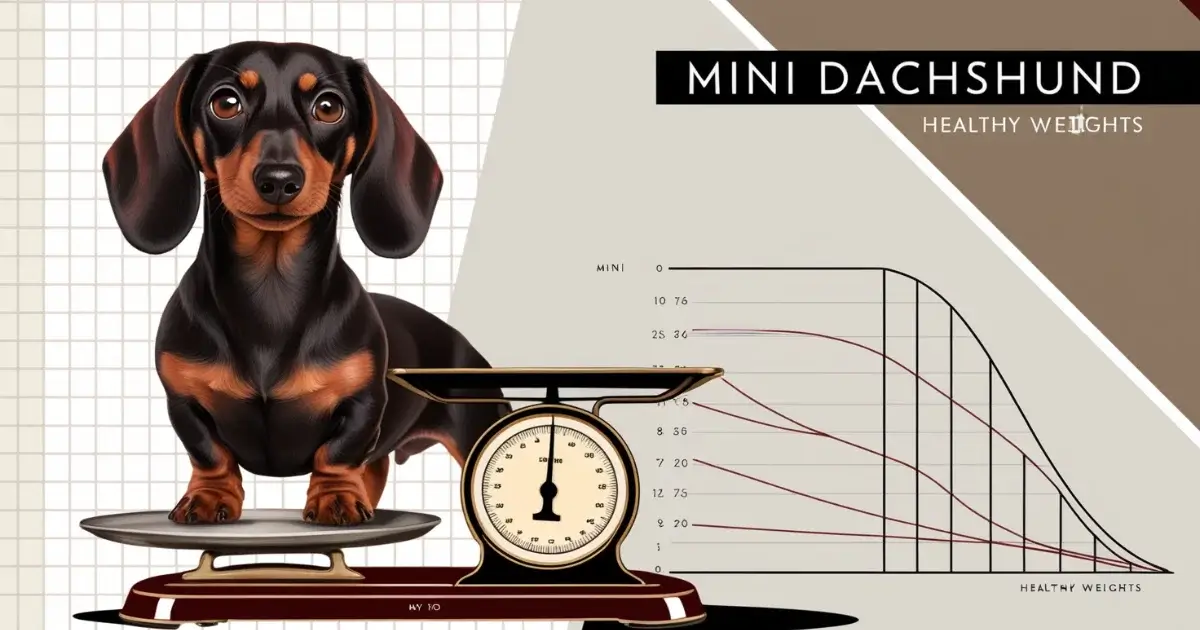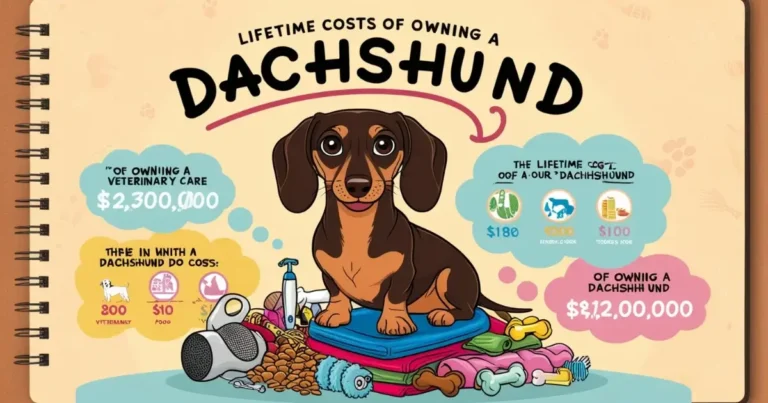How Much Should a Mini Dachshund Weigh? Healthy Weight Guide
Understanding how much should a mini dachshund weigh is important for keeping your little dog healthy and happy. Dachshunds are small but mighty, and they need a balanced weight to stay strong and avoid health issues. Let’s go through some helpful tips, weight charts, and growth milestones to give you a clear idea of what’s right for your mini dachshund.
Table of Contents
Ideal Weight for a Mini Dachshund
So, what’s the right weight? According to experts, a mini dachshund should weigh less than 11 pounds as an adult. Standing at about 5–6 inches tall, they’re smaller than the standard dachshund. While each dachshund is unique, staying under 11 pounds helps ensure they’re within a healthy range. And yes, both genetics and lifestyle play a role here, but this gives a good benchmark for keeping your mini dachshund in shape.

Growth Chart for Mini Dachshunds
Tracking your mini dachshund’s weight as they grow can give you peace of mind. Here’s a growth chart showing the typical weight at different ages:
| Age | Minimum Weight (lbs) | Average Weight (lbs) | Maximum Weight (lbs) |
| 3 Months | 5 | 5.5 | 6 |
| 6 Months | 8 | 8.5 | 9 |
| 9 Months | 10 | 10.5 | 11 |
| 12 Months | 10 | 10.5 | 11 |
Puppy Weight Milestones for Mini Dachshunds
At 3 months, your mini dachshund should weigh around 5–6 pounds. By 6 months, most will be between 8 and 9 pounds. And by 9 to 12 months, they’ll reach their adult weight. Knowing these milestones helps you see if they’re growing on track.
Full Growth Expectations for Mini Dachshunds
Usually, mini dachshunds are fully grown by 12 months. After that, their weight stabilizes. You might notice a bit of “filling out” in the months that follow, but by a year, they’re basically done growing.
Factors Influencing Mini Dachshund Weight
Several factors can affect how much should a mini dachshund weigh. Let’s look at the main ones: genetics, diet, and exercise.
Genetics and Parental Influence
The size of a mini dachshund’s parents often hints at how big they’ll grow. If the parents were on the small side, your puppy might be too. And vice versa. That’s just the way genetics works.
Diet and Nutrition Impact on Weight
Feeding your dachshund a balanced diet helps keep their weight in check. They need plenty of protein, especially as puppies. A poor diet can lead to weight problems, so sticking to high-quality, vet-recommended food keeps their energy up and their weight steady.
Exercise and Activity Level
Even though they’re little, mini dachshunds need regular exercise. Walks, playtime, and mental challenges all help keep their weight in check. And believe it or not, they have a lot of energy! Regular activity helps prevent weight gain and keeps them in good shape.
Healthy Weight Maintenance for Mini Dachshunds
Keeping a mini dachshund at a healthy weight involves a mix of good food, exercise, and a steady routine. Here’s how you can manage it.
Setting Up a Feeding Schedule
It’s best to feed a mini dachshund on a regular schedule. Most experts suggest two meals a day. Feeding them at the same times daily helps regulate their energy and prevents overeating.
Exercise Recommendations for Weight Control
Daily walks and gentle play are ideal for mini dachshunds. You don’t need to go overboard, but consistent movement keeps them fit. Plus, they love to move around!
Monitor Treats and Snacks
Be careful with treats. While they’re a nice reward, too many can lead to weight gain. Try to give treats in moderation and avoid high-fat snacks. Small portions are key here.
Common Weight-Related Health Concerns in Mini Dachshunds
Weight is not just about appearance—keeping your mini dachshund at a healthy weight can prevent several health issues.
Risks of Obesity in Mini Dachshunds
Obesity in dachshunds can lead to health issues like diabetes, heart disease, and joint pain. Extra weight also strains their spines, which are prone to injury. Keeping them at an ideal weight helps prevent these issues and supports their long-term health.

Weight and Spinal Health
Dachshunds have long backs and short legs, so extra weight can put them at risk for spinal conditions, like intervertebral disc disease (IVDD). A healthy weight helps protect their spine and reduces the risk of injury.
What to Do if Your Mini Dachshund is Underweight
If you notice that your mini dachshund isn’t gaining weight as expected, it could indicate a health problem. Underweight dogs may need a vet visit to rule out issues like parasites or dietary problems. Make sure they’re getting the right food and enough of it to support their growth.
When to Seek Veterinary Advice
If your mini dachshund’s weight seems off, it’s best to check in with a vet. Weight changes can signal health problems, so it’s better to be cautious.
Recognizing Growth Issues in Puppies
If your puppy isn’t meeting their weight milestones, a vet can help identify the cause. Puppies usually grow quickly, so if yours isn’t, it’s worth investigating.
Adult Dachshunds with Unexpected Weight Changes
For adult dachshunds, sudden weight loss or gain can indicate health concerns like thyroid problems or diabetes. Regular vet visits help catch any issues early.
Conclusion: Supporting Your Mini Dachshund’s Healthy Weight
Knowing how much should a mini dachshund weigh helps you care for them better. By focusing on a balanced diet, regular exercise, and routine vet visits, you’ll help your mini dachshund live a happy, healthy life.
FAQs
How does a mini dachshund’s weight affect its health?
Extra weight can put strain on a mini dachshund’s spine, leading to conditions like intervertebral disc disease (IVDD). Keeping a healthy weight supports better mobility and reduces risks of related health problems.
How much should I feed my mini dachshund to maintain a healthy weight?
A mini dachshund’s diet should be high in protein but given in controlled portions. Generally, feeding twice daily helps maintain a stable weight and supports a balanced energy level.
Can a mini dachshund’s weight impact its lifespan?
Yes, an overweight mini dachshund may face a shorter lifespan due to health risks like heart disease and diabetes. A healthy diet and regular exercise can help extend their life expectancy.
What are signs my mini dachshund may be underweight?
Signs of being underweight include visible ribs, low energy, or a rough coat. If you notice these signs, a vet visit can help rule out dietary or health issues affecting their weight.







